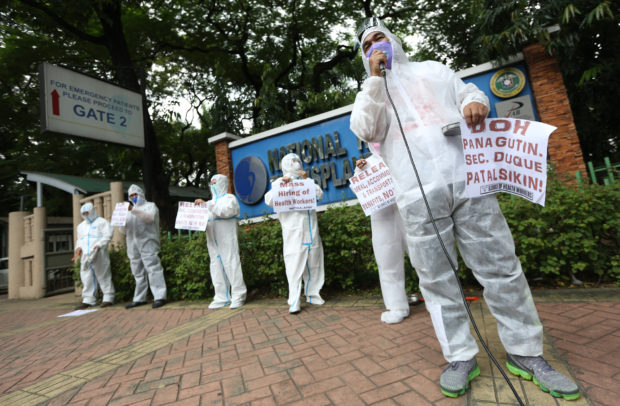
HEAR US. Health workers from the National Kidney and Transplant Institute in Quezon City use their break on Monday, National Heroes’ Day, to join a noise barrage and die-in protest to assail the Department of Health over its poor management of the pandemic and for neglecting their situation amid the delayed release of their government benefits. —NIÑO JESUS ORBETA
MANILA, Philippines — Over 100,000 healthcare workers at the frontlines against COVID-19 have yet to receive their special risk allowance (SRA), Health Undersecretary and treatment czar Leopoldo Vega said on Wednesday.
According to Vega, the Department of Health (DOH) earlier told Congress that the number of health workers directly catering to COVID-19 patients was at over 526,000.
“The number of projected health workers in the frontlines that we have submitted to the bicam in Congress is 526,000. We have given [the SRA to] almost 379,000 and 20,000 plus, so actually we are just looking at 100,000 plus healthcare workers to whom we are going to give the SRA,” Vega told ABS-CBN News Channel’s Rundown.
“We are slowly moving towards it. That’s roughly about 76 or 78 percent of the healthcare workers totality in terms of the frontliners,” he added.
Meanwhile, Vega noted that the DOH has also provided compensation to over 23,000 healthcare workers who had COVID-19.
In addition to 379,000 health workers who have already received their SRA, the DOH earlier downloaded P311 million funds for 20,000 more frontliners. The DOH said that P237 million of the said amount was already disbursed to hospitals.
The agency has already requested another P201 million for the SRA of 17,000 more health workers. It added it is awaiting the list of other eligible beneficiaries to be submitted to its regional offices.
The DOH assured it was trying to provide the SRA to health workers who have yet to receive the said benefit, as some frontliners protest against the delay of their risk allowances.